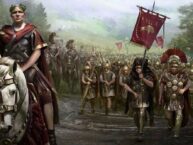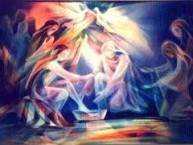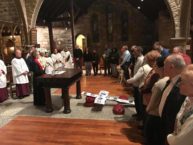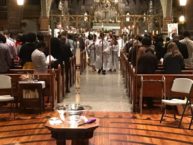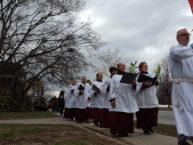 November 8, 2015: May God’s words alone be spoken, may God’s words alone be heard. Amen.
November 8, 2015: May God’s words alone be spoken, may God’s words alone be heard. Amen.
Not for nothing, but I love that part of the Psalm this morning. You know, the part where the Psalmist proclaims “It is in vain that you rise so early and go to bed so late; vain, too, to eat the bread of toil, for [God] gives to [God’s] beloved sleep.” Oh yeah. I LOVE that, don’t you? Okay, maybe all you morning people don’t, but THAT would make a great sermon.
But, it isn’t what I will be preaching about today (though I will think about it later over a nice nap).
How many of you heard about the televangelist who asked his congregation to each give $300 so that he could buy a new $65 million dollar jet for his ministry? I wish this was a lead-in to a joke, but unfortunately, it is not. The pastor, Creflo Dollar, certainly lives into his surname, and it might make for some great comedy, except that he is not the only one, and worse – he does this as a self-professed “Christian” leader. I have to say that if THAT is what following Christ meant, I wouldn’t be a Christian.
Now some, like Creflo Dollar, might hear today’s gospel and think… “Awesome! This will be great for Stewardship Season!” but, if they really read this gospel (or the bible for that matter), this passage out to scare the crap out of them.
This is not a gospel about giving all you got. At least, not in the way some might think.
The gospel of Mark pairs things together for a reason, and you need to read this story in the context of what precedes and follows it. In the gospel Jesus and his disciples have arrived in Jerusalem. The end is coming soon. In fact, as I said last year, this is the first Sunday of Advent as far as the ancient church was concerned, and it shows in the readings, as Jesus is nearing the end of his days, and over the next several weeks, predicts his death, resurrection, and 2nd coming as we prepare to welcome in the first – his birth at Christmas. So here he is in Jerusalem at the temple teaching and telling everyone to “Beware of the scribes, who like to walk around in long robes, and to be greeted with respect in the marketplaces, and to have the best seats in the synagogues and places of honor at banquets! They devour widows’ houses and for the sake of appearance say long prayers. They will receive the greater condemnation.”
“Beware of the scribes.”
In today’s language, “beware of the privileged class – the rich and powerful – the heads of state, and the CEOs – and pastors living in mansions or buying jets too.” No, not necessarily because they have power or money, but because they sometimes have ceased to do the work of God, caring only about what is in it for them, and not about the God that should be IN them.
Now, if Jesus had stopped there, after condemning the scribes, that would be lesson enough, right? We would understand the hypocrisy of claiming to be a person of faith, and yet give preferential treatment to those who have abundant means. If you think that could only happen in those mega churches than remember that the Episcopal Church was once (and perhaps still) known as the “Frozen Chosen.” Hanging on the back wall of our church is a pew rental chart from the early part of the last century. There was a time when, instead of pledging, we rented the seats. If you wanted to sit down, you paid money to support the church. If you wanted a cushion for that seat, you paid more money. And worse…if you paid more, you got better seats – you sat right up front near the Rector. Now, not for nuthin’, but if it were me paying in that sort of system, I’d have paid more to sit far in the back near an exit, how about you, right? We moved to pledging so that it could not be known (or should not be anyway) who gives what to the church. Everyone can sit anywhere – merit is not earned by your pledge, as parishioners are not given information on who gave what. Essentially pledges to the church become a matter between the donor and God, not how it impresses others. That’s the idea anyway, though I understand in some churches, people do what they can to make sure others know about their pledge – the modern version of wearing long robes, praying long public prayers, and sitting in the best seats. Thankfully, not here.
So yes, Jesus gives us a lesson about the importance of humility, as he derides those in power. But, there is more here.
Jesus then talks about the widow with her mighty mites.
The gospel continues with Jesus sitting opposite the place where people put their offerings for the temple. The story goes that “Many rich people put in large sums. A poor widow came and put in two small copper coins, which are worth a penny. Then [Jesus] called his disciples and said to them, “Truly I tell you, this poor widow has put in more than all those who are contributing to the treasury. For all of them have contributed out of their abundance; but she out of her poverty has put in everything she had, all she had to live on.”
It would be easy for people to praise the widow’s actions, and implore everyone to do the same – Lord knows, pastors have done that through the ages – telling parishioners to be like the widow and “give till it hurts.” Give till it hurts? Really? God help the church. Seriously.
For far too long, some have lifted up this part of the text as if Jesus is applauding the woman’s deep sacrifice. But if you read it…Jesus doesn’t praise her or condemn her. That isn’t his point. What Jesus does do, as he always does…he notices her.
The Jesus that went to the dark tomb of Lazarus, the Jesus that dines with those on the margins, the Jesus that sees those whom others cast aside…this Jesus once again calls us all to notice the ones others do not see – this woman. We can be sure no one else did that day in the temple. Jesus sees her, warns the disciples to take notice of her, where the temple does not.
Jesus isn’t talking about “giving till it hurts,” but about remembering who we are and what we are called to do. He is condemning the institution that would not only allow her to give of all that she had, but would not even see her, instead seeing only those who give out of their abundance, who give feeling nothing. She was invisible to them. After showing this to his disciples, Jesus leaves the temple, and as we hear next week, predicts its destruction, to be replaced by something he is building – a new way of being in the world.
As a people of God, throughout scripture, we are told to remember the poor, the orphan, the stranger, the widow. To love God, love ourselves, and love our neighbor. That is our work in life. That is what institutions, like the temples, mosques, and churches, that serve God and God’s people are supposed to be doing.
In other words, if you are the proverbial widow – part of our society that is cast aside, poor, hungry, lonely, forgotten – the church should be pledging to you, not the other way around. Pledging our eyes to see you, our hearts to feel your pain and offer you love, our voice to fight against the injustice that has harmed you, and yes – our time and treasure to assist you. And when the church does not do that? Then we need not fear being destroyed, as Jesus predicts for the temple, because we are already dead. We have stopped being the church alive, living out God’s radical call of love for all the world, but instead become an institution living for itself, like a snake eating its tail.
So what happens to us? Why do we sometimes fail to see the widow in our midst? We don’t start out like that, but I think we can lose our way. There is a story about a rich man and a wise rabbi that I heard once.
One day a certain old, rich man of a miserable disposition visited a rabbi, who took the rich man by the hand and led him to a window. “Look out there,” he said. The rich man looked into the street. “What do you see?” asked the rabbi. “I see men, women and children, gardens and animals” answered the rich man.
Again the rabbi took him by the hand and this time led him to a mirror. “Now what do you see?” “Now I see myself,” the rich man replied.
Then the rabbi said, “Behold, in the window there is glass, and in the mirror there is glass. But the glass of the mirror is covered with a little silver. No sooner is the silver added than you cease to see others but see only yourself.”
We can often let money blind us to what is important, it’s silver sheen covering the glass we look through, hiding from us the faces of the widows, whom we are called to love and to serve. We can sometimes also get so caught up in working for what we want that we forget to see what we need. And, what we need isn’t something that is about us alone, but about our very identity as children of God. We might feel like we have enough if we have a nice roof over our heads, food on the table, and clothes to keep us warm. But, the truth is – we don’t.
No, I’m not suggesting we also need a $65 million dollar jet, or anything like it. I’m suggesting that it isn’t about us alone. It never is. Because we can never feel full when our neighbor is hungry. We can never feel truly warm, when our neighbor is without shelter. We can never feel we have achieved enough, when our neighbor is in need.
When working on this sermon, the Lord’s prayer kept moving in and out of my consciousness; and, a thought randomly came to me…a reflection really. I posted it our church Facebook page, and it goes like this:
“…Give us today our daily bread”…because I am hungry. No, not me personally, but so long as there is anyone who is without the food they need, than I hunger. My sister or brother who is in need, is need within my soul. I cannot ignore their pain, for it is mine to bear. My daily bread is the body of Christ that nourishes me to go and feed others. So yes, God, please give me daily bread, not as manna from heaven, but as nourishment to do Your work, so that all may be fed….
We hold onto what we think we need, even sometimes clamoring for more than that – changing want into need in our mind’s eye. But that wealth we are after, is not something we should be measuring in monetary terms, but in how we use our life and our money, if we have it, for those less fortunate. Because in the end, what we accumulate materially here on earth is temporary. We can’t take it with us.
Ann Landers had an interesting letter in her column once. It was from a girl who was writing about her uncle & aunt. She said, “My uncle was the tightest man I’ve ever known. All his life, every time he got paid he took $20 out of his paycheck & put it under his mattress. Then he got sick & was about to die. As he was dying, he said to his wife, “I want you to promise me one thing.” “Promise what?” she asked. “I want you to promise me that when I’m dead you’ll take my money from under the mattress & put it in my casket so that I can take it all with me.” The girl’s letter went on with the story. “He died, & his wife kept her promise. She went in & got all that money the day he died & went to the bank & deposited it, and wrote out a check and put it in his casket.”
Now, that’s a bit of a silly story, not even sure it is true, but it makes the point that we can sometimes forget what is important in this life, and in the next. Money can be a great tool, but only if we use it as a means to an end, an end that includes the widows of the world, and not the end itself. But if we begin to believe that our identity is tied to our material wealth, we lose our way, because who we are, and the legacy we leave behind, is never defined by our money, but about how we live. There are poor people and rich people who are living examples of how to love neighbor and God, and there are poor people and rich people who rob themselves and others of the dignity every human person deserves.
Folks, Jesus isn’t pointing us to look at the scribes and the widow as a way to increase pledges to the church. Jesus is telling the church – all of us – to take a hard look at what we privilege, what we value, and who we ignore. And to remember that the greatest of gifts are the ones we do for God, in service to God’s people, without there being any benefit to ourselves, and sometimes for people that we not only struggle to see, but those we might find difficult to love. It is those types of gifts, the ones that begin with gestures the world might value at only two mites, that God values above all else. It is the widows that we are asked to see, to love, and to serve.
The widows today are the immigrant, the refugee, the poor, the homeless, the marginalized, the unwanted, the lonely, and the unloved. They are the ones in grief, in despair, in the darkness of depression, the prison of addiction, or in the shackles of discrimination. They are all over the world, in our neighborhoods, and even here in our church, if we only open our eyes to see them.
Today, as part of our Stewardship season, you will be given two special replica mites, similar to what the widow in our story might have dropped into the treasury. Take these home with you as a reminder of the widow – as a reminder that hers was not a story about money, but about seeing, really seeing, the widow in our midst, and doing something about it.
The story of the widow’s mite isn’t about personal piety, but about the contrast of two types of people – those who talk their faith, and those who live it.
It is about the work we do here, and the work we do outside these walls, as reasons we pledge to the church, in humility, and not for some measure of privilege.
It is about what we value, and how we live those values in the world.
It is about being given our daily bread, and sharing it with others until all are fed.
It is about giving – not till it hurts, but to heal a hurting world.
May God open our eyes to see the widows of today, reordering our priorities to love and serve the Christ in them.
Amen.
For the audio of the sermon from the 10:30am service, click here:
The Rev. Diana L. Wilcox
Christ Church in Bloomfield & Glen Ridge
November 8, 2015
Pentecost 24 – Year B
1st Reading – Ruth 3:1-5; 4:13-17
Psalm 127
2nd Reading – Hebrews 9:24-28
Gospel – Mark 12:38-44

